Foreign
Chad’s transition in jeopardy as deadline looms

With an electoral process dominated by the interim president and former ruling party, Chad’s transition is in jeopardy. With an electoral process dominated by the interim president and former ruling party, Chad’s transition is in jeopardy.
After an unconstitutional takeover in 2021, Chad’s transition to democracy is entering its final phase, with the adoption of the new constitution last December. In preparation for presidential elections before October 2024, a National Election Management Agency and Constitutional Council have been set up – but how free and fair will these polls be?
Having returned from exile, Succès Masra, leader of the strongest opposition party Les Transformateurs (The Transformers), was appointed prime minister on 1 January. His decision to join the government means the opposition’s ability to criticise the administration will be diminished.
The electoral process is dominated by the transitional president, Mahamat Déby, who was selected by the former ruling party, the Patriotic Salvation Movement (MPS), as its candidate for the presidential elections.
The law on the election agency’s powers, organisation and functioning was adopted by the National Transitional Council on 26 January. It enshrines the agency’s independence and its members’ immutability during their seven-year mandate – two principles aimed at guaranteeing impartiality.
However, the way its members are appointed is problematic. Of the 15 members, eight are chosen by the transitional president, four by the Senate president, and three by the National Transitional Council president. In the absence of a Senate, it’s up to the council president, who is the former MPS secretary-general, to appoint these four members.
The election agency chairman, Ahmed Bartchiret, is a magistrate and former president of the Supreme Court, but also a member of the former ruling party and close to Déby. He chaired the National Dialogue’s ad hoc commission, which recommended delaying the transition for two years. Most other officers and members of the election agency are also from the former MPS.
The Constitutional Council, which will be responsible for adjudicating electoral disputes, is headed by Jean-Bernard Padaré, a former minister, deputy secretary-general and spokesperson for the MPS. Seven out of the council’s nine members are affiliated with the former ruling party or allied parties.
Civil society and the opposition believe that with an electoral body controlled by the transitional president, who will likely contest the election, the dice are loaded against them from the start.
Neither of the opposition political party coalitions – the Consultation Group of Political Actors and the Republican Platform – recognise the National Transitional Council, Supreme Court, Constitutional Council, or election agency. Civil society and opposition parties – including Les Transformateurs, which now heads the government – are not represented in the election agency and Constitutional Council. To ensure total control over the upcoming polls, the MPS-transitional president team has taken the lion’s share of positions.
Government Minister and Secretary-General Ramatou Houtouin described the election agency as ‘a permanent institution, with no political nuances, whose members are formally prohibited from serving as leaders of political parties, thus reinforcing its neutrality.’
But in practice, the agency’s composition contradicts this vision and the country’s constitution. Article 238 says that ‘in carrying out its mission, the National Agency for the Management of Elections shall act with complete independence, impartiality, integrity, transparency and professionalism.’
This is reminiscent of how the national commission responsible for organising the constitutional referendum in 2023 was set up. Despite the Transition Charter guaranteeing this institution’s neutrality, it too was dominated by stakeholders close to the transitional president. Even though they were not strongly contested, the referendum results left many perplexed by both the turnout and the outcome.
Meanwhile, political dialogue between the MPS, government and opposition parties appears to be at a standstill. The Kinshasa Convention, an agreement between the transitional government and Les Transformateurs, was presented as fostering reconciliation but has been criticised by other opposition parties and civil society. They say it’s only binding on the two signatories and is a political agreement that undermines a broader discussion and consensus in Chad.
The election agency and Constitutional Council play a vital role in organising and managing voting and arbitrating any disputes that may arise. Their ability to do so independently and impartially is crucial to their success and credibility – and Chad’s peace and stability.
The current election preparations are far from ideal. Dialogue is essential for Chad to move forward. Masra, an opposition member and current prime minister, could be the perfect link between the presidency and the rest of the political class. And although the appointment of a mediator provides leverage for discussion, time is running out.
Chad’s partners who have supported the transition from the start should offer their services to bring stakeholders together, ease tensions and obtain a minimum consensus around the forthcoming elections. These include the Economic Community of Central African States, the African Union, the United Nations through the fund to support Chad’s political transition, France and the European Union. The ECCAS facilitator remains central to coordinating actions and achieving better results.
Foreign
FG, stakeholders commend EU over disability rights funds

*Decry USAID funding cut
By Francesca Hangeior
The Federal Government and stakeholders, has applauded the European Union for funding a project aimed at advocating the rights of Persons with Disability in the wake of the halt in funding by the United States Agency for International Development.
They gave the tributes at the official launch of the Disability Rights Advocacy Project for Inclusive Development, a three-year initiative co-funded by the EU in collaboration with the Christian Blind Mission held in Abuja.
The Executive Secretary of the National Commission for Persons with Disabilities, Ayuba Burki, described the project as a welcome development.
He said, “This project is very commendable. As it is a three-year project, it is our desire that this will go as planned for all persons with disability to be involved. Disability programmes are not exclusively the purview of some persons in organisations.
“It means all hands must be on deck, and we must achieve our set goals. So I am delighted and look forward to a successful implementation of this programme in the next three years. We call on other partners to follow suit so that at the end of the day, people living with disabilities can heave a sigh of relief.”
Burki also rued the funding cut of USAID by United States President Donald Trump, saying it will put pressure on many third-world countries.
He also sees it as an opportunity for leaders in the affected countries to look inward and find solutions.
“I will call on African leaders to take up this challenge and look inward. I believe that USAIÐ was doing a great job. But we cannot abandon caring for our people because it pulled out. We need to look inward and re-strategise.
“Who knows? This may be a blessing in disguise. So I don’t see a cause to worry. But it is an opportunity to look inward and solve funding and reprioritise our priorities as a nation. We will be fine at the end of the day,” he stated.
The Founder of The Albino Foundation, Chief Jack Epelle also shared his sentiments.
Epelle warned that Nigeria and many other developing nations cannot continue to depend on USAID funding forever.
He said, “I think it’s a good and bad omen. It is a good omen because it is high time we begin to take our eyes off development funding and begin to develop ourselves so that we, in turn, can fund others. This kind of event should propel us to look inward and begin to see how to meet the needs of the people by ourselves.
“The bad omen is that there are projects USAID has started and individuals were employed. Some projects were expected to run for three to five years. It will create hardships. Several children will be out of school, and many families not sure of where their next meal will come will suffer.”
He, however, praised the European Union for agreeing to undertake the advocacy of persons with disabilities, especially at the grassroots.
Earlier in his address, the CBM Global Head of Programme Implementation, Bright Ekweremadu, said the project couldn’t have come at a better time.
Ekweremadu also hailed the EU for taking up the bold initiative to continue funding humanitarian projects at a time when President Donald Trump halted USAID funding in Africa and other regions.
He said, “We all know what recently happened to USAID. So when you see a global donor or funder for programmes like this, we need to prostrate and think of them for coming to the aid of the less privileged and vulnerable in society.
“Today is a bold declaration of purpose in a shared commitment to a future where every Nigerian, regardless of their ability, has a right to dignity, opportunity and full participation in the society.
“It is our collective response to the persistent inequalities that persons with disabilities face every single day of their lives, sometimes consciously from us. Together, let us build a Nigeria where disability will be recognised, every voice will be heard, and no one is left behind.”
While appreciating the gesture from the audience, the head of the European Union delegation, Wynyfred Egbuson, emphasised the need to advocate for the cause of the less privileged in society.
According to her, the EU-CBM project was signed after a conscious and rigorous exercise of assessing its possible impact.
She said, “Today’s event is an outcome of the long process that started in June 2024 with a call for proposals by civil society organisations and human rights organisations within and outside Nigeria through a competitive and rigorous process that entails three stages of assessment.
“The CBM and its co-implementing partners were selected from 31 applications, leading to the project being launched today. It is estimated that over 25 million people live with disability in Nigeria. This translates to one in every 10 Nigerians.
“Unfortunately, persons with disability are among the most vulnerable members of our society. They face social stigma, exploitation, discrimination and exclusion from participating in the society. We believe that a lot still needs to be done.”
Foreign
China retarliates with 84% tarrifs on US products from 12midnight
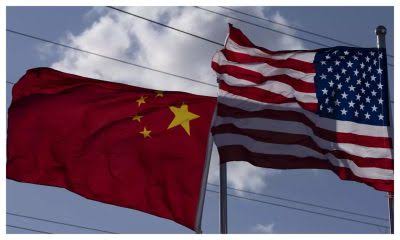
China will impose 84 percent tariffs on US imports, up from 34 percent, the finance ministry said Wednesday, hours after similar levies by the United States came into force.
US President Donald Trump’s latest salvo of tariffs came into effect on dozens of trading partners Wednesday, including punishing 104 percent duties on imports of Chinese products.
Beijing has consistently opposed tariff rises and said Wednesday it would take “firm and forceful” steps to protect its interests.
Its finance ministry later said in a statement that “additional tariff rates” on imports originating in the United States would “rise from 34 percent to 84 percent”, effective from 12:01 pm on Thursday.
“The tariff escalation against China by the United States simply piles mistakes on top of mistakes (and) severely infringes on China’s legitimate rights and interests,” the ministry said.
Washington’s moves “severely damage the multilateral rules-based trade system”, it added.
In a separate statement, Beijing’s commerce ministry said it would blacklist six American artificial intelligence firms, including Shield AI Inc. and Sierra Nevada Corp.
The companies had either sold arms to Taiwan or collaborated on “military technology” with the island, the commerce ministry said.
Foreign
EU says it prefers negotiations, but proposes first tariffs on US imports

The European Commission said on Monday it had offered a “zero-for-zero” tariff deal to avert a trade war with U.S. President Donald Trump as EU ministers agreed to prioritise negotiations, while striking back with 25% tariffs on some U.S. imports.
The 27-nation bloc faces 25% import tariffs on steel and aluminium and cars and broader tariffs of 20% from Wednesday for almost all other goods under Trump’s policy to hit countries he says impose high barriers to U.S. imports.
On Monday evening, the Commission proposed its first retaliatory tariffs at 25% on a range of U.S. imports in response to Trump’s steel and aluminium tariffs rather than the broader levies.
However, the list was shortened after the EU executive bowed to pressure from member states and removed bourbon, wine and dairy after Trump threatened a 200% counter-tariff on EU alcoholic drinks. France and Italy, major exporters of wine and spirits, were particularly concerned.
EU trade chief Maros Sefcovic said earlier on Monday the retaliation would impact less than the previously announced 26 billion euros ($28.4 billion). The tariffs for most of the goods will go into effect May 16 and some from December 1.
Ministers overseeing trade met in Luxembourg on Monday to debate the EU’s response and discuss relations with China. Many said the priority was to launch negotiations to remove Trump’s tariffs, rather than fight them.
Michal Baranowski, deputy economy minister of Poland, told a press conference after the meeting that his EU counterparts did not want to be “trigger-happy”.
Sefcovic said discussions with Washington were at an early stage and that he had offered “zero-for-zero” tariffs for cars and other industrial products, expressing hope that discussions could begin.
However, Trump’s top trade adviser on Monday dismissed tech-billionaire Elon Musk’s push for “zero tariffs” between the U.S. and Europe, calling the Tesla CEO a “car assembler” reliant on parts from other countries.
“While the EU remains open to – and strongly prefers – negotiation, we will not wait endlessly,” Sefcovic said, adding the bloc would push ahead with countermeasures and steps to avoid floods of diverted imports.
The EU is set to approve the first retaliatory measures this week. The bloc will start collecting the tariffs on April 15, with a second tranche starting a month later.
The removal of bourbon from the list of items subject to the EU’s retaliatory tariffs on U.S. imports “would be great news, and we are hopeful this is the case,” said Chris Swonger, chief executive of the Distilled Spirits Council of the United States. “It would be the first step toward getting the U.S.-EU spirits sectors back to zero-for-zero tariffs and untangling distilled spirits products from these wider trade disputes.”
EU KEEPS ALL RETALIATION OPTIONS OPEN
The bloc is expected to produce a larger package of countermeasures by the end of April, as a response to U.S. car and broader tariffs.
Sefcovic said the EU was ready to consider all retaliatory options. One is the EU’s Anti-Coercion Instrument, which allows it to target U.S. services or to limit U.S. companies’ access to EU public procurement tenders.
“We are prepared to use every tool to protect (the) single market,” he said, echoing the views of French Trade Minister Laurent Saint-Martin.
In a war of tariffs on goods, Brussels has less to target than Washington, given EU goods imports from the U.S. totalled 334 billion euros ($366.2 billion) in 2024, against 532 billion euros of EU exports to the U.S.
Some EU countries, particularly those exposed to trade with the United States, urged caution. Irish Foreign Minister Simon Harris described the Anti-Coercion Instrument as “very much the nuclear option.”
Baranowski of Poland said EU members were willing to keep options open, with a stress on proportionality.
“There were various ideas put on the table. Some countries mentioned services. Others didn’t. Some countries mentioned digital services, others didn’t,” he said.
Outgoing German Economy Minister Robert Habeck said the EU should realise it was in a strong position – if it was united.
“The stock markets are already collapsing and the damage could become even greater … America is in a position of weakness,” he said in Luxembourg.
-

 News21 hours ago
News21 hours agoAmbassadorial list ready for NASS review after DSS clearance – FG
-
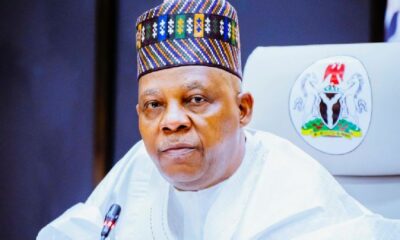
 News16 hours ago
News16 hours agoSecurity operatives halt attempt to break into VP Shettima’s residence, nab suspect
-

 News16 hours ago
News16 hours agoSuit Seeking To Sack Ibas As Administrator Suffers Heavy Setback
-

 News8 hours ago
News8 hours agoConstituents Drag Akpabio, Senate to Court Over Suspension of Natasha
-
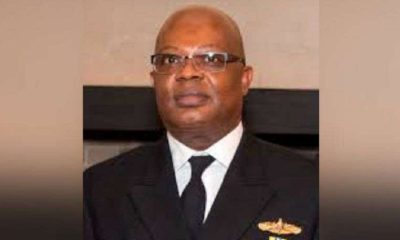
 News14 hours ago
News14 hours agoIbas pouring petrol on fire in Rivers, Briggs laments
-

 News21 hours ago
News21 hours agoPopular actress passes away + Photo
-
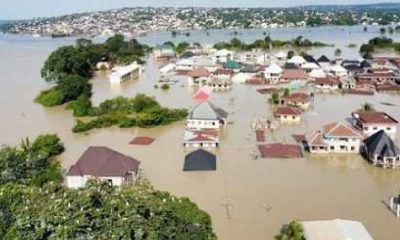
 News21 hours ago
News21 hours agoFG Issues Flood Warning for 30 States and FCT in 2025: Communities Urged to Prepare (Full List)
-
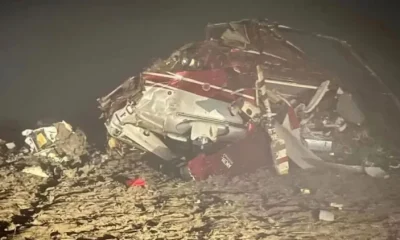
 News15 hours ago
News15 hours agoPAINFUL! Six Persons Perish In Helicopter Crash






